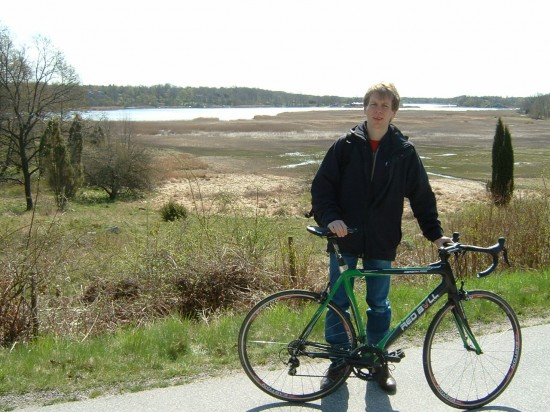Interview with Jakob Weber – PraTLA student at Energy Agency for Southeast Sweden
Interview: Lena Eckerberg

Hej Jakob! How did you find out about the PraTLA-Project?
To be honest, I´ve found out about PraTLA by incident. While I was looking for potential companies for an internship, I asked the Erasmus coordinator at my home University in Dresden (Saxony/ Germany) for a list of companies working in the field of environmental economics. Thus, I´ve got in touch with the Energy Agency for Southeast Sweden. After sending my application, the staff manager mentioned the PraTLA program.
PraTLA trainee at Energy Agency of Southeast Sweden provided support for a number of projects
written by Lena Eckerberg
Climate compensation and sustainable indicators
Joshua Spencer is studying International Business and Environment at McGill University. He is currently a summer intern who has been placed at the Oskarshamn office of the Energy Agency of Southeast Sweden where he has provided support for a number of projects within the agency
and those of surrounding municipalities.
Tina Larsen, energy and climate adviser in a Swedish municipality: Two PraTLA trainees gave her new inspirations in her daily work
written by Lena Eckerberg
Inspiration and a New Start
The energy and climate adviser Tina Larsen in the municipality of Älmhult, along with students from Allbo Learning Centre, were asked to conduct an analysis on the transportation of personal care assistants. The students themselves chose to do their internship in Älmhult.
Mayors gathered to share spirit of Växjö
More than 30 mayors from all EnercitEE regions came together in Växjö, Sweden from 30 May to 1 June 2012 to visit several examples of “Europe’s greenest city” and to exchange energy efficiency solutions at the local level.
Policy maker exchange – mayors from the EnercitEE partner regions will travel to Växjö, Sweden
From 30 May to 01 June 2012 the city of Växjö in Smaland, Sweden welcomes interested mayors from the different EnercitEE partner regions to provide an inside into its climate protection and energy policy and its vision to become a fossil fuel free city until 2030. The city of Växjö has been called “the greenest city of Europe” by many journalists, a recognition for its visionary sustainability strategy.
During the 2 day meeting the mayors will learn why and how Växjö’s vision could have been and will be implemented that successfully. Furthermore they will be presented exemplary energy efficiency measures and solutions in the fields of transport, heat/cooling generation and – distribution, public participation and future strategies that have already been carried out by the city, such as:
Cycle lanes/ boxes
Most CO2 emissions arise in the transport sector. That is why the city fosters the use of bicycles. A map illustrates the 150 km of cycle paths.
Free parking – for biogas, REM, DME, electrical and hybrid cars
This is an incentive to encourage people to use environmentally friendlier cars.
Bus station – biogas bus
The buses in Växjö are run with biogas produced in the sewage treatment plant in Växjö.
16 Saxon mayors will learn from Växjö – the city with the visionary climate protection and energy policy
Within the framework of EnercitEE a study trip to Växjö, Sweden will be organised from 30 May to 01 June 2012. The city of Växjö represents a shining example for climate protection with focus on energy efficiency and use of regional biomass.
From 01 December 2011 to 25 January 2012 mayors throughout Saxony were welcome to apply for taking part in the study trip. Therefore mayors of the Saxon municipalities needed to describe implemented or planned measures regarding future energy supply in the municipality as well as his/her expectations on and motivation for participating in the study trip. Out of the 27 received applications the jury consisting of representatives of the Saxon State Office for the Environment, Agriculture and Geology, the Saxon State Ministry of the Environment and Agriculture and Saxon Energy Agency (SAENA GmbH), selected 16 mayors that will go to Växjö.
CLIMATE ADAPTATION – Information to politicians and municipal officials
On the 1st of September the municipality of Växjö (Sweden) held a meeting addressed to politicians and municipal officials (staff) about climate adaptation. The politicians and staff that attended the meeting showed a diversity of experience and knowledge, since they represented different administrations within the municipality. About 40 persons attended and most of them held management positions within their administration.
Sharing experiences in Sweden – RIEEB partners meet in Ronneby
Partners from the RIEEB sub-project met in Ronneby and Växjö in the south of Sweden at the end of September. The sub-project is all about validating energy calculations so that we will actually live up to the higher aims of reducing energy consumption and green house gases.
Two days were spent discussing outputs, results, what to do, what has been done and what has not been done. All this was done under the strict supervision of project manager Stefan Vetter from SAENA in Dresden.
There were also ample opportunities for study visits e.g. Portvakten in Växjö which is Sweden’s first apartment building constructed in wood and with passive house-technique.
RIEEB partners will meet in Sweden
This week partners from Sweden, Germany, Poland and France will meet in the South of Sweden to discuss how far we have come in the RIEEB-project. The main item on the agenda is the validation tool that each country uses to confirm that calculated energy targets are met in real-life.
Let’s make a trip to the world of energy – energy day in a Swedish kindergarten
In May we spent two days in a Swedish kindergarten to talk about the topic energy. The kindergarten is not far from Oskarshamn, deep in the forest on the Swedish countryside. As we smelled the country air we knew we were right. There the kids have a close contact to the nature and to the animals. They learn to take care of them- in my opinion a really good concept.






